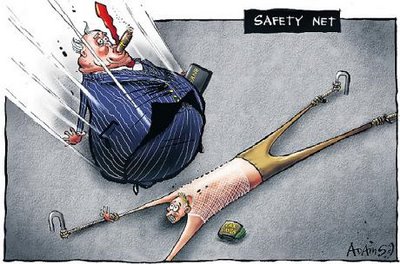Are we about to become utterly fucked?
 It's understandable that a lot of people are getting terribly excited about someone who isn't a Bush ascending to the presidency of the United States of America, but left behind has been a major lack of any real substantive comment on the latest bail out of the banks, or rather, as it's beginning to already look, the further throwing of money at a lost cause.
It's understandable that a lot of people are getting terribly excited about someone who isn't a Bush ascending to the presidency of the United States of America, but left behind has been a major lack of any real substantive comment on the latest bail out of the banks, or rather, as it's beginning to already look, the further throwing of money at a lost cause.Even if you opposed the original bail out, few were so dismissive of Brown and Darling to claim that they didn't know what they were doing; quite the opposite in fact. While they may have been authoratitive then, they were left looking anything but yesterday morning. They're not helped by the fact that no one, including them, has any idea of just how much effectively providing insurance to the banks for their losses in exchange for them to return to lending is going to cost, for the simple reason that no one it seems, Brown and Darling included, still has any idea of just how much the banks have lost through the collapse of the sub-prime market. This is part of the reason why the City has took such fright and been getting out of Royal Bank of Scotland as quickly as it can - when a bank that is over 70% owned by the state is still not potentially revealing the true nature of its losses, already estimated at £28bn, the idea that RBS is in fact bankrupt and has only been propped up the taxpayer quickly gains traction.
To give an indication of just how quickly we might be moving from another bail-out to full nationalisation of most, if not all of the banks, John McFall, chairman of the Treasury select committee and regarded as close to Gordon Brown, is already calling for both RBS and Lloyds to be fully nationalised, in what could well be a softening up exercise. The implications of such a move should not be understated - taking RBS alone into the public sector would put more than a year's GDP onto the already massive and continually growing national debt. With this fast becoming an increasingly ominous prospect, there's already talk that this could result, inevitably, in a sovereign debt crisis, where the buyers of the debt refuse to take any more, leaving us to go cap in hand to the IMF and also probably the EU.
For the moment this is not yet a full-blown crisis - undoubtedly Ireland and the United States itself are in far more dire straits than we are - but the underlying cause remains the same. For all the talk from the government that this is an American problem imported here on the back of the collapse in the US housing market, it was the hubris of Brown in imagining that he had abolished bust while instituting a light-touch regulatory system which in fact turned out to be a no-touch regulatory system which allowed our own banks to get involved in the toxic loans in the first place. Undoubtedly, the main share of the blame should fall on the bankers themselves, especially the likes of "Sir" Fred Goodwin, who slashed jobs while devouring the likes of ABN Amaro in a truly disastrous predatory move. They were however encouraged by a government which had fallen completely for the mantra of neo-liberalism in the City whilst expanding the public sector too quickly. As ever, New Labour wanted results and it wanted them fast, and to be fair in certain areas it has shown - the NHS, despite the cynics, has been markedly improved. Less apparent are the advances in education, where the obsession with reform has created a gaggle of schools which to this blogger look nightmarish in their controlling tendencies, whilst failing to boost the results sufficiently to mitigate such policies.
The boast since the original bail out that the government had saved the banks has been accurate. Without the injection of funds, RBS and HBOS may well have gone bust, with all the implications that the letting of Lehman Brothers fail caused, not just here but around the world. The fear now must be that all the original bail out has succeeded in doing is postponing just that, with the state shortly to be forced to fully intervene. The jibes at the Tories that they are a do nothing party will look even hollower if it turns out that doing something was almost as bad as doing nothing. If the bank shares continue to fall tomorrow, things really might be about to get a whole lot worse.
Labels: Alistair Darling, banks bailout, credit crunch, economics, fall of Gordon Brown, New Labour, politics, recession, Royal Bank of Scotland, socialism for the rich, we're all doomed

